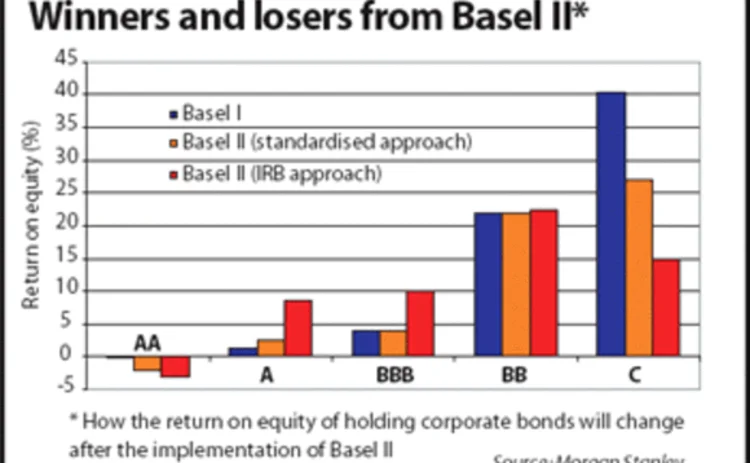
Basel II to boost bank bondholdings

Basel II could have a major impact on the bond markets, according to a new report from Morgan Stanley. The report, Basel II – Impact on Spreads, argues that banks are likely to increase their bondholdings as a result of their assumed rate of return increasing under Basel II. This is because Basel II links economic risk to the amount of regulatory capital that needs to be set aside to cover it. Banks will be more likely to buy highly rated bonds than sub-investment grade, and more likely to buy fixed-income assets in general than equities.
The assumed rate of return will increase on large sections of European banks’ fixed-income holdings under the new regime. Since banks are among the major buyers of bonds – they typically make up about 25% of the market for triple-B rated corporate new issues – any shift in their buying patterns could have a huge impact on the market as a whole. The Morgan Stanley report says European banks have over €10 trillion in risk-weighted assets, “so even if they are investing a tiny proportion of this in the fixed-income markets, it’s still enough to move spreads.”
The report says banks are likely to begin rebalancing their portfolios by early 2006 in preparation for Basel II implementation. The report looks at the likely return on equity (ROE) of a range of fixed-income assets, based on the likely risk weightings under Basel II. It bases its assumptions on the likelihood that most banks will implement the Foundation IRB (internal ratings-based) approach from day one.
In the case of corporate bonds, those rated single-A will benefit most from Basel II. Triple-Bs will also see their ROE more than double, but double-Bs stay the same and single-Cs deteriorate. Relatively speaking, single-A rated bonds improve more than triple-Bs, but in outright terms triple-Bs will rise to an ROE of 10.05%, which means more banks will be attracted to this grade.
The report uses Marks & Spencer to illustrate how a triple-B rated corporate borrower will be affected. For a bank using the Foundation IRB approach, the ROE on Marks & Spencer bonds will rise from 12.3% under Basel I to 30.7% under Basel II.
The report points out that since the market is now in a tight spread environment, and there are unlikely to be significant shifts in asset allocation until the end of next year or early in 2006, it is likely that “a more normalised spread environment [will] amplify the asset reallocation process of banks”.
Only users who have a paid subscription or are part of a corporate subscription are able to print or copy content.
To access these options, along with all other subscription benefits, please contact info@risk.net or view our subscription options here: http://subscriptions.risk.net/subscribe
You are currently unable to print this content. Please contact info@risk.net to find out more.
You are currently unable to copy this content. Please contact info@risk.net to find out more.
Copyright Infopro Digital Limited. All rights reserved.
As outlined in our terms and conditions, https://www.infopro-digital.com/terms-and-conditions/subscriptions/ (point 2.4), printing is limited to a single copy.
If you would like to purchase additional rights please email info@risk.net
Copyright Infopro Digital Limited. All rights reserved.
You may share this content using our article tools. As outlined in our terms and conditions, https://www.infopro-digital.com/terms-and-conditions/subscriptions/ (clause 2.4), an Authorised User may only make one copy of the materials for their own personal use. You must also comply with the restrictions in clause 2.5.
If you would like to purchase additional rights please email info@risk.net
More on Structured products
A guide to home equity investments: the untapped real estate asset class
This report covers the investment opportunity in untapped home equity and the growth of HEIs, and outlines why the current macroeconomic environment presents a unique inflection point for credit-oriented investors to invest in HEIs
Podcast: Claudio Albanese on how bad models survive
Darwin’s theory of natural selection could help quants detect flawed models and strategies
Range accruals under spotlight as Taiwan prepares for FRTB
Taiwanese banks review viability of products offering options on long-dated rates
Structured products gain favour among Chinese enterprises
The Chinese government’s flagship national strategy for the advancement of regional connectivity – the Belt and Road Initiative – continues to encourage the outward expansion of Chinese state-owned enterprises (SOEs). Here, Guotai Junan International…
Structured notes – Transforming risk into opportunities
Global markets have experienced a period of extreme volatility in response to acute concerns over the economic impact of the Covid‑19 pandemic. Numerix explores what this means for traders, issuers, risk managers and investors as the structured products…
Structured products – Transforming risk into opportunities
The structured product market is one of the most dynamic and complex of all, offering a multitude of benefits to investors. But increased regulation, intense competition and heightened volatility have become the new normal in financial markets, creating…
Increased adoption and innovation are driving the structured products market
To help better understand the challenges and opportunities a range of firms face when operating in this business, the current trends and future of structured products, and how the digital evolution is impacting the market, Numerix’s Ilja Faerman, senior…
Structured products – The ART of risk transfer
Exploring the risk thrown up by autocallables has created a new family of structured products, offering diversification to investors while allowing their manufacturers room to extend their portfolios, writes Manvir Nijhar, co-head of equities and equity…







